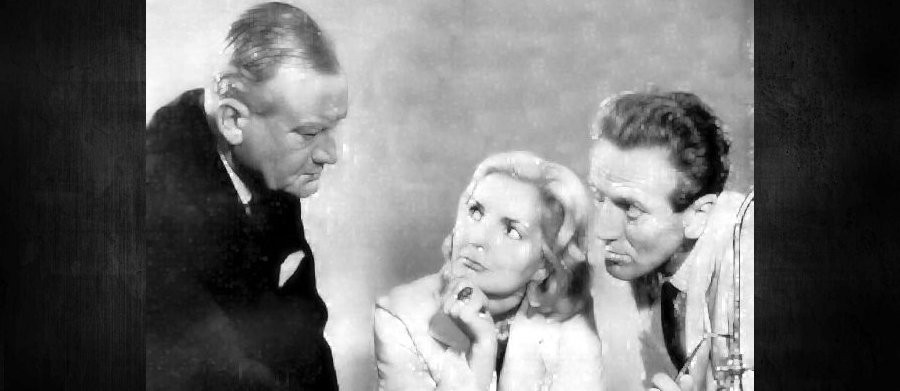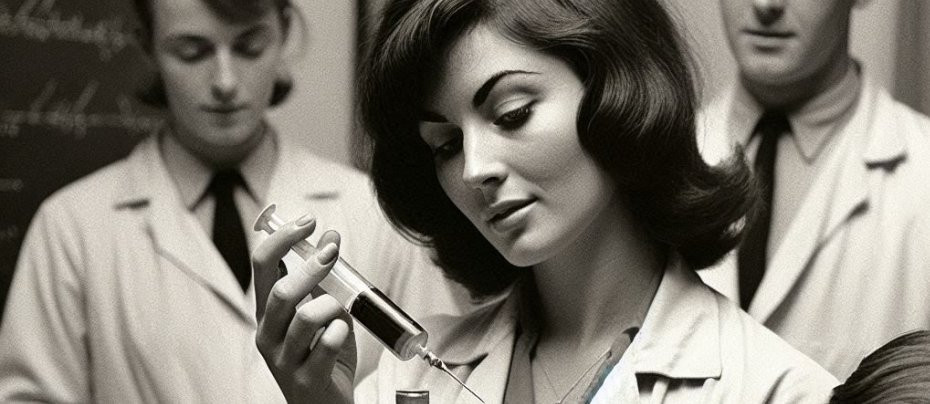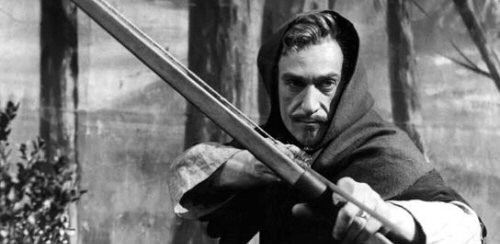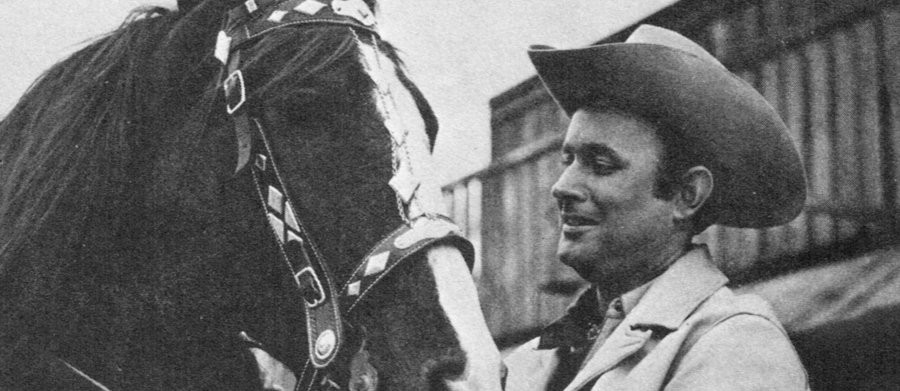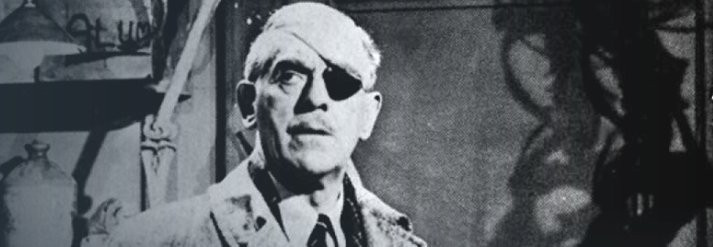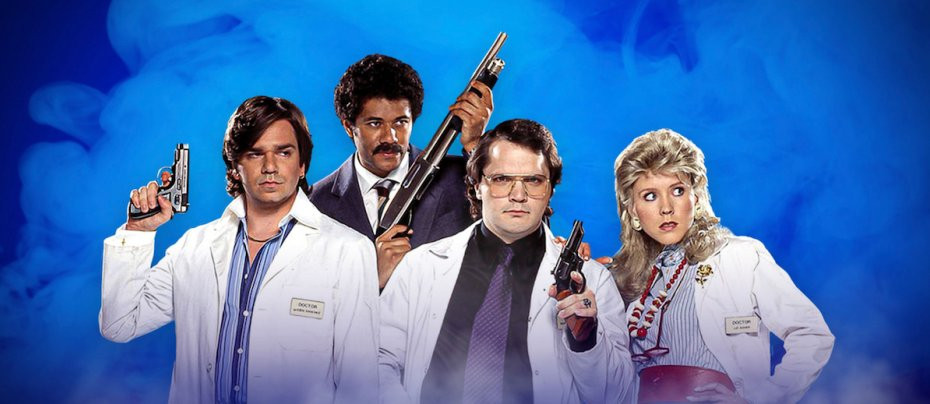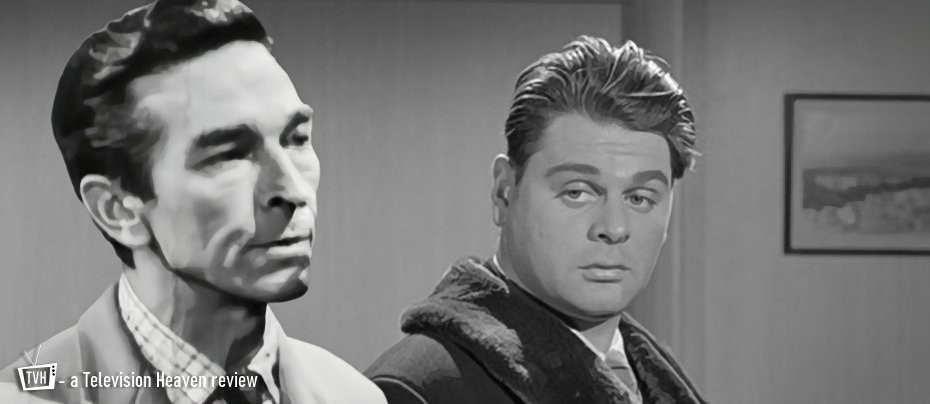
Time Slip
1953 - United KingdomThe following review is for a television play that was performed live and went out unrecorded. Therefore this review is based on historical information available in printed archives from 1953. The above picture shows two of the stars of the production, Jack Rodney and George Murcell, but it is not from the production, as no photographic record is known to exist.
Time Slip was something of an oddity in the BBC’s development of science fiction/horror plays and series for television. Broadcast on 25 November 1953, the 30-minute play, according to one report, was a fill-in after the withdrawal of a Panorama presentation, although it was most certainly billed in the Radio Times for that week even if there was no cast list printed with it.
The Radio Times did introduce the concept of the play with a short article which read: ‘Many writers have been fascinated by the idea of time and the tricks it can play. Very few of us understand the Fourth Dimension-to say nothing of the Fifth and Sixth-but some of us have an uneasy feeling that there is a great deal more to time than just yesterday, today and tomorrow.’
The BBC obviously felt as though the horror content was more prominent in this production because the critic Jac Poynton, writing in the Birmingham Gazette, mentioned a ‘grave-faced announcer’ telling the home audience ‘that it was unsuitable for nervous viewers’ and ‘advising you to switch off if you can't take it.’ He suggested that the Corporation should ‘show a little discrimination in awarding "H" certificates.’
Time Slip follows the story of John Mallory (Jack Rodney), who, after dying, is revived through an adrenaline injection. While physically normal, he experiences a strange phenomenon: his sense of time is off by 4.7 seconds. He can understand what’s said to him and respond clearly, but his replies come 4.7 seconds before the questions are even asked.
Dr. Slade (Robert Ayres), a hospital psychiatrist, becomes intrigued by Mallory's unusual condition and is determined to find a cure. After consulting with his physicist friend, George Ingram, Dr. Slade comes up with a drastic and highly unorthodox solution. He decides to smother Mallory with a pillow, effectively killing him, before reviving him once more with a more controlled adrenaline injection, hoping this will restore his time sense.
Charles Eric Maine, the pen name of David McIlwain, was a renowned writer, primarily known for his science fiction serials published in the 1950s and 1960s. He also wrote detective thrillers under the pseudonyms Richard Rayner and Robert Wade.
Born on January 21, 1921, in Liverpool, England, Maine began his writing career by co-editing a science fiction magazine called The Satellite, which ran for three issues with J. F. Burke. From 1940 to 1941, he also published his own magazine, Gargoyle. During World War II, Maine served in the Royal Air Force, stationed in Northern Africa in 1943.
After the war, he worked in TV engineering and became involved in radio and TV editorial work. In 1952, he sold his first radio play, Spaceways, to the BBC. Its success led to it being adapted into a novel and a film. One of his most famous novels, Timeliner, told the story of a scientist who invents a time machine, only to be maliciously sent into the future by a fellow scientist who was having an affair with his wife. The novel was originally written as a radio play titled The Einstein Highway.
Other cast members included Harold Jamieson, John Sullivan (a professional stunt coordinator who was later responsible for the stunts performed in Jason King, The Adventurer and acted as a stunt double for Tony Curtis in The Persuaders!), Joan Warburton and George Murcell who was the voice for Professor Rudolph Popkiss in Gerry Anderson’s Supercar during its first season. He would go on to become a number of ‘foreign undesirables’ in many 60s and 70s series such as The Baron, The Saint, and The Avengers, often turning up in them on more than one occasion.
Critics were divided on Time Slip. H de Winton Wigley (himself the author of With the Whiskey Smugglers) writing in the London edition of the Daily News on 26 November 1953 wrote: ‘Charles Eric Maine's play "Time Slip" on TV last night seemed to bring me memories of days long ago when they tied victims on to sawmills or railway lines. Not in plot perhaps but rather in atmosphere and effect. And of course brought up to date and keeping in step with modern science. The elastic improbability was stretched to a fine degree and with sufficient reward in the way of interest. The play was well acted, but I thought the medical men sounded more like big business in conference.’
Leonard Mosley writing in the Daily Express was less complimentary: ‘I wonder how many viewers under the age of 17 watched last night's TV play, "Time Slip" by Charles Eric Maine? If it had been shown in a cinema the doorman would probably not let them in - for here was a story that would have got an X certificate.
But TV doesn't have to worry about that.
Yet the setting was a hospital where a man, fished out of the river was brought back to life by a drug. A psychiatrist finds the patient answers questions before he has been asked them - that he is, in fact, four and a bit seconds in time ahead of everyone else. So the psychiatrist smothers the man to death, and gives him another injection, just to get him back on G.M.T.’
I might have found this hocus-pocus bearable if it had been presented playfully or cynically. Played as straight melodrama it seemed boring to know exactly from half-way through what was coming next - by much more than four and a bit seconds.’
Leslie Ayre in the (London) Evening News said the play ‘didn't thrill me at all. It didn't even make me laugh - which is the least a horror play can do when it fails to chill. It was in fact a pretty boring half hour.’
Two years later, Anglo Guild Productions made a much-expanded movie version (93 minutes) titled Timeslip (The Atomic Man in the U.S. running at 76 minutes) starring Gene Nelson (Oklahoma!) and Faith Domergue, an American film and television actress who had a reputation as a 'scream queen' due to her performances in a number of horror films.
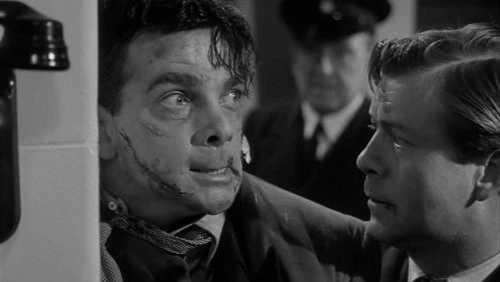
Filmed at Merton Park Studios, the story begins with an injured man being pulled from the Thames, having been shot in the back and left barely alive. The science correspondent of an illustrated magazine recognizes him as a nuclear physicist. However, the physicist is soon found alive, well, and working in his laboratory. When the injured man is photographed, a strange glow appears around him, and when he is well enough to be questioned, his answers seem nonsensical. It’s revealed that his perception of time is 7.5 seconds ahead of his interrogator's.
The correspondent and his photographer girlfriend take it upon themselves to solve the mystery, uncovering a web of international industrial espionage and a grave threat to the atomic research institute. Maine adapted the script into a novel titled The Isotope Man, published in 1957. This became the first of three novels featuring reporter Mike Delaney. The New York Times described the novel as "fairly crude and preposterous but lively enough."
Seen this show? How do you rate it?
Seen this show? How do you rate it?
Published on March 24th, 2025. Written by Laurence Marcus for Television Heaven.



